hankyoreh
Links to other country sites 다른 나라 사이트 링크
[Special Features Series: April 3 Jeju Uprising, Part V] Young generation learn a painful history
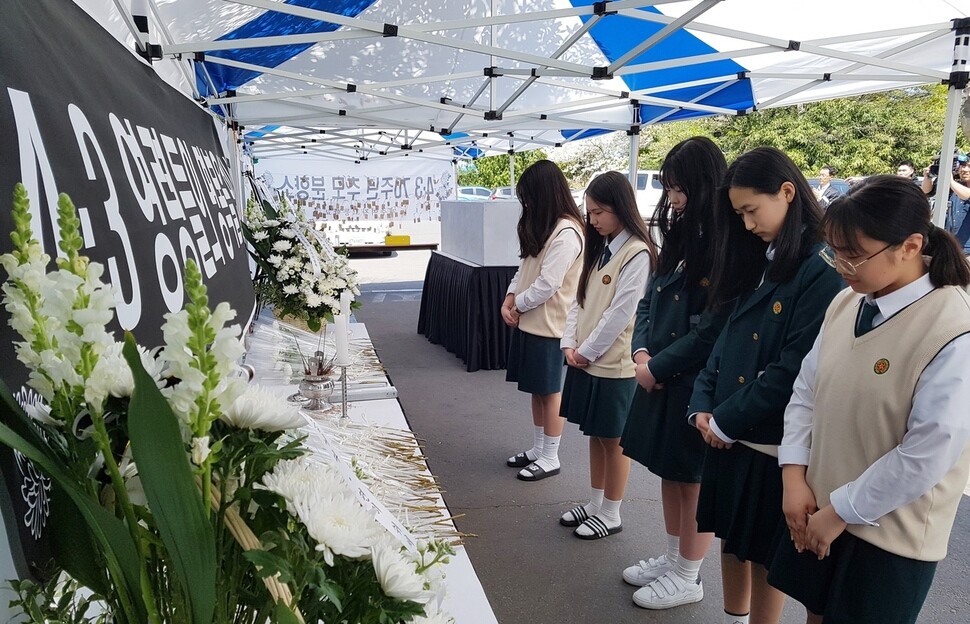
After lunch on Apr. 2, small groups of students filed into a pavilion pitched in front of the gymnasium at Jeju Girls’ High School. The pavilion contained a memorial altar for the Apr. 3 Uprising on Jeju Island, which the school had organized independently to mark the uprising’s 70th anniversary this year. Inside the tent is an explanation of the uprising and a literary exhibition complete with a “white stone monument” that the students made themselves.
First-year students on the school’s Apr. 3 Day of Remembrance Committee came to school on Sunday, Apr. 1, the day before the event, to create the “white stone monument” by painting the wooden materials.
“I took part to get a deeper understanding of the Apr. 3 Uprising. While taking part in this activity, I’ve come to think that peace and human rights are even more important,” said Kim Hyeon-ju, 17.
“Since we live on Jeju Island, we of all people ought to know about the Apr. 3 Uprising,” said Kang Eun-jin, 17.
“We built the memorial altar and the white stone monument so that the students could actually feel and see the Apr. 3 Uprising and Massacre. We recruited 20 first-year students to be on the Apr. 3 Committee, but there was so much interest that a full 60 people applied,” said Song Hyeong-il, 34, a teacher who was painting the wood with the students.
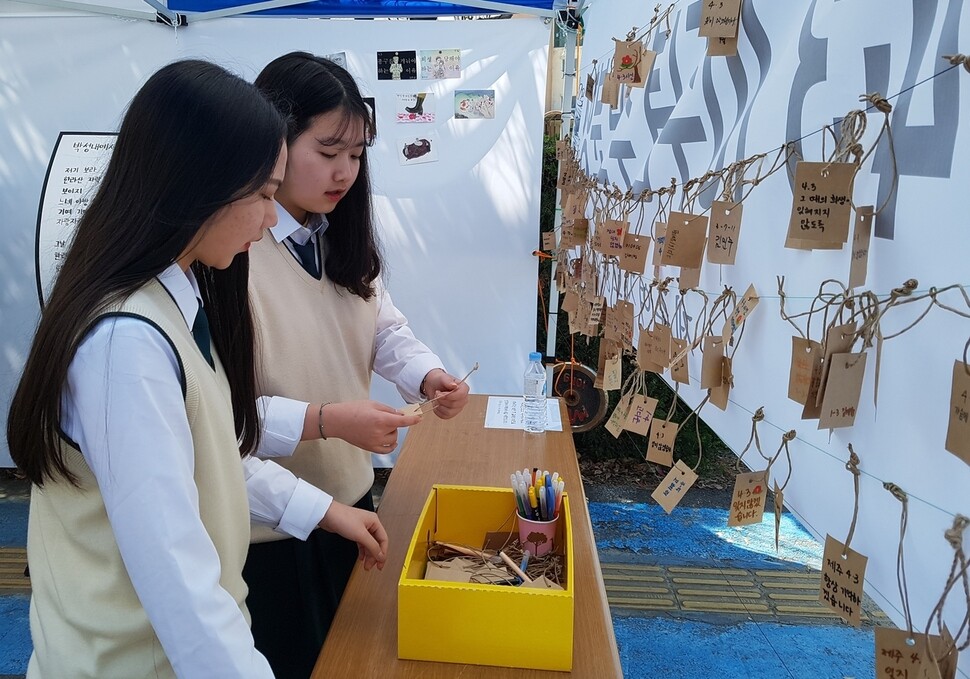
While many young people throughout the island were hurt during the Apr. 3 Uprising and Massacre, losses were particularly severe among students at Jeju Girls’ High School. On Apr. 2 and 3, the school is having students set up the memorial altar in front of the gymnasium and writing what the uprising means to them on the white stone monument. “It’s a small memorial, but it’s significant because the students organized the committee themselves and took ownership in planning and operating it,” said Kim Gi-beom, 42, head teacher for first-year students.
On the scene of education about the Apr. 3 Jeju Uprising
Daejeong Township in Seogwipo was another area where the Apr. 3 Uprising caused a great deal of damage. Students who are part of “Remember the Apr. 3 Uprising,” a student-organized club at Daejeong High School, shot a 20-minute short film called “Camellia Flowers of April” dealing with the uprising.
“The members of the club stayed up late at night in discussion, wrote the script themselves and made the movie,” said Kang Su-beom, 18. The ten members of the club served as the crew and actors and recruited students from other schools in the area – Daejeong Girls’ High School, Daejeong Middle School and Daejeong Elementary School – bringing the total number of people participating in the film to 25.
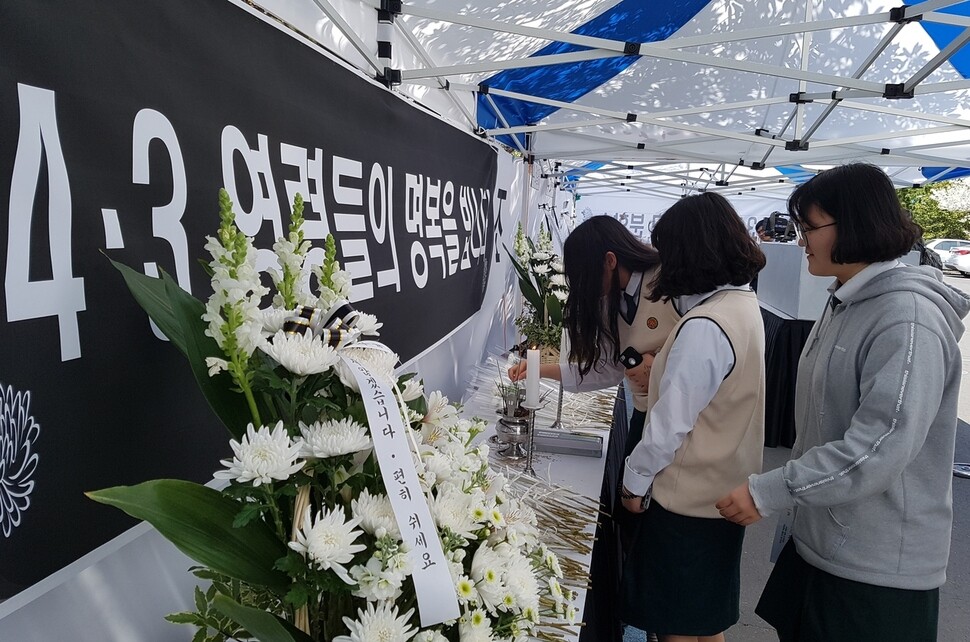
“At first, we were thinking about making UCC [user-created content], but our discussion kept expanding from putting on a play to shooting a film,” said Lee Jong-chan, 18, a second-year student at the school and an officer in the club.
The film was shot at Keunneolpgwe, a cave where Jeju residents took shelter during the Apr. 3 Uprising and Massacre; Seotal Oreum, a hill where residents were placed in preventive detention and then slaughtered; the Baekjoilsonjimyo Cemetery; Seongeup Folk Village; and in front of the school. The main character of the movie is Seok-min, who is sick of always eating potatoes and runs away from home just when the uprising is being suppressed. When he hides in a cave, one of his neighbors gives him a potato, which he eats through his tears. Later, he leaves the group in the cave and goes to a coastal village, only to be put into preventive detention and killed at Seotal Oreum during the Korean War.
“My great-grandfather died during the Apr. 3 Uprising. While I was making the movie, I thought about how he must have suffered and how he must have felt,” said Lee Seok-min, 18, who plays the leading role.
“When we were shooting the scene in the cave, we burned chili peppers to create smoke, which got the tears flowing,” he said with a laugh.
One of the major challenges for Koreans on the 70th anniversary of the Apr. 3 Uprising is educating the younger generation about what happened and teaching them lessons about it. “The task for us today is healing the wounds on the beautiful landscape of Jeju. The Apr. 3 Uprising is not just history from 70 years ago; it should be transformed into a living present and a hopeful future, and Apr. 3 Uprising education about peace and human rights is at the heart of that,” said Lee Seok-mun, superintendent of education for Jeju Island.
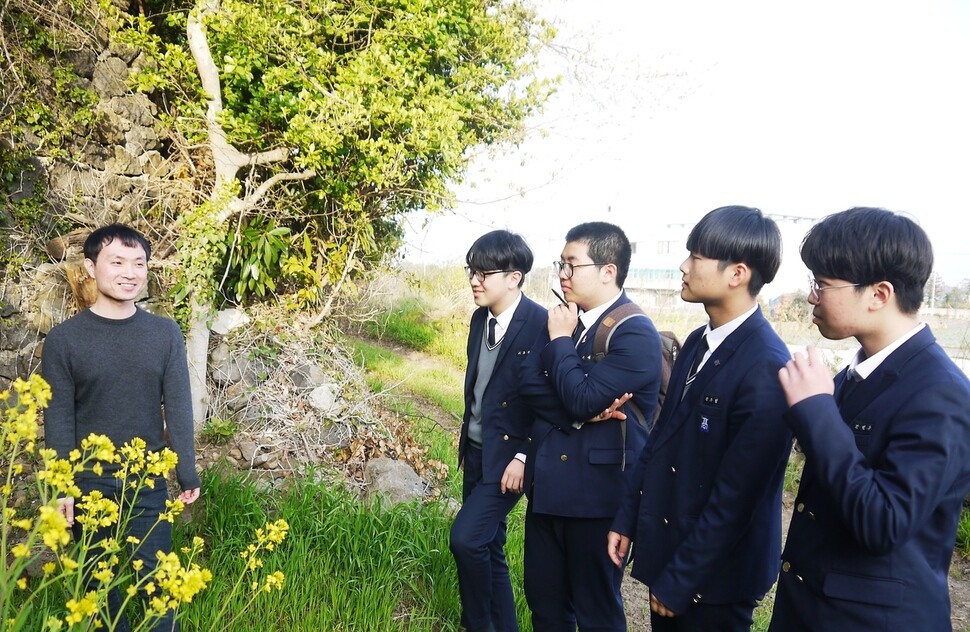
Unfinished tasks which remain
Since the democratization movement in June 1987, the historical taboo surrounding the uprising has gradually weakened. Even so, there are still many tasks that remain to be resolved. There needs to be more research about the victims, who are estimated to range from 25,000 to 30,000; the harm caused by torture and collective punishment; the perfunctory trials of the people imprisoned during the uprising; the destruction of villages and property; and the direct and indirect involvement of the US.
A revised version of the Special Act on Discovering the Truth of the Jeju Apr. 3 Incident and the Restoration of Honor of Victims that would provide the victims with compensation and reparations, annul the military tribunal that did not abide by proper protocol and restore the reputations of those who were incarcerated is currently pending in the National Assembly.
The Jeju Apr. 3 Victims’ Families Association says that the issue of compensation and reparations for the victims is the most urgent issue to address. That was one of the campaign pledges that President Moon Jae-in made when he was running for president.
“It’s absurd for the government to apologize for state violence without taking any follow-up measures. I think that it’s the duty of the Moon administration to provide the victims of the Apr. 3 Uprising with compensation and reparations since the uprising resulted from the excessive use and abuse of government authority, which is the most serious social problem to address,” said Park Myeong-rim, a professor at Yonsei University.
“Now that some progress has been made in uncovering the truth and restoring the victims’ reputations, the final stage in achieving justice is compensating them for their injuries,” said Kim Jong-min, a former expert member of the National Committee for Investigation of the Truth about the Jeju 4.3 Events.
“Even if we can’t prosecute and punish the guilty parties since 70 years have passed, achieving closure and genuine healing for the wounds of the past requires that we bring the truth into the light instead of hiding it and determining the cause, process and culpability. Otherwise, the roots cannot be healed,” said Kang U-il, bishop of the Catholic Diocese of Jeju.
Some people also think that the future of the Apr. 3 Uprising and Massacre must begin with human rights.
“The truth of the Apr. 3 Uprising and Massacre needs to cover not only the uprising itself and the massacres but also the government’s extreme suppression over the past 70 years, the fervent campaign to discover the truth and all the oppression and resistance to that oppression in recent years. The universal value of human rights must be emphasized. Nov. and Dec. 1948, when the most of the massacres were occurring during the Apr. 3 Uprising, was ironically the time when the Universal Declaration of Human Rights was adopted,” said Kim Heon-jun, a professor of politics and foreign policy at Korea University.
“When minimum human rights standards are being set, the Apr. 3 Uprising should serve as an important guideline for what not to do,” said Park Chan-sik, chair of the Pan-Korean Committee on the 70th Anniversary of the Jeju Apr. 3 Uprising and Massacre.
“The inter-Korean summit and the North Korea-US summit must succeed. They’re supposed to turn a page in a tragic history and open a new road toward cooperation, peace-building and development. Jeju Island can be a symbol of overcoming, by showing how such a tragic history can be overcome,” said John Merrill, a former Northeast Asia bureau director for the US State Department who wrote an academic paper on the Apr. 3 Uprising and Massacre
“We need to learn how Jeju sought reconciliation and coexistence from the inside without an apology from the outside for what it suffered during the Apr. 3 Uprising and Massacre. This shows us a way to overcome the conflict between South and North Korea and the conflict between different groups inside South Korea. The US also needs to be willing to offer consolation and an honest apology for its actions during the uprising,” said Park Myeong-rim.
“The assessment of the Apr. 3 Uprising and Massacre, the level of support and the attitude toward victims’ families must not change with every handover of power in the central or local government. It would be great to have a social compact that sets a joint course that is to be followed no matter which party takes power,” Park added.
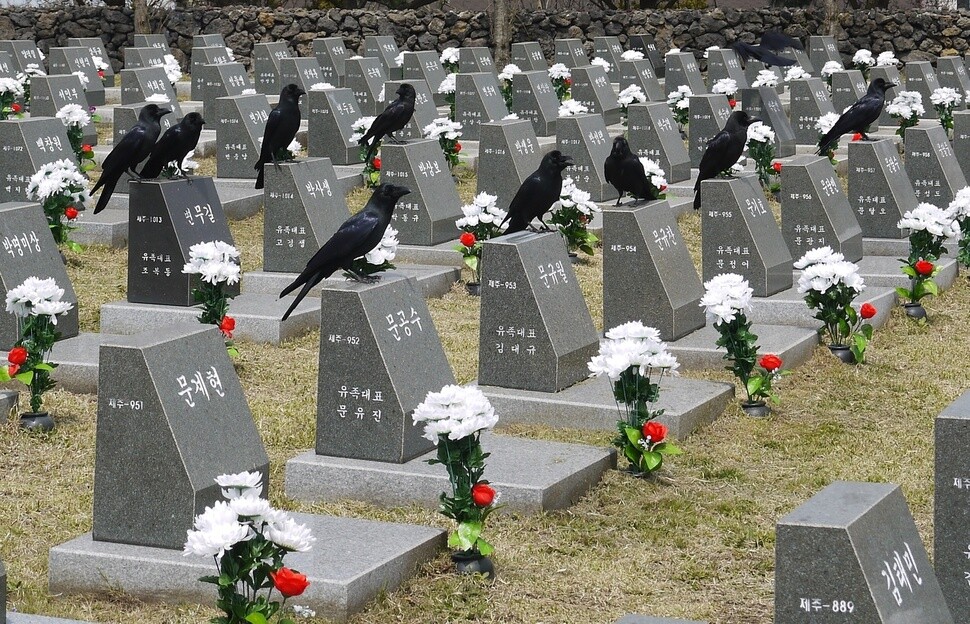
Other experts argue that Korean society should deal with problems that are closer to home because the surviving victims of the Apr. 3 Uprising and Massacre and other marginalized people need society to pay attention to them. “We must not let anyone else suffer alone. There are people who have suffered for their entire life because of injuries received during the Apr. 3 Uprising and Massacre but never received recognition from the government. There are also people who were forced to change their family name because of the uprising but later were not allowed to regain their original name. We need to take an interest in the surviving victims of the uprising who remain in the shadows of marginalization,” said Heo Yeong-seon, director of the Jeju Apr. 3 Research Institute.
The Pan-Korean Committee on the 70th Anniversary of the Jeju Apr. 3 Uprising and Massacre, which was launched in Apr. 2017, has drawn up the following 10 challenges and demands: carrying out an additional governmental fact-finding investigation; institutionalizing the restoration of damage for victims, surviving families and communities; passing a law to learn the truth about the people imprisoned through illegal trials and restoring their reputations; systematizing the preservation and maintenance of historical sites; creating a permanent system for reporting victims and surviving families; excavating the remains of the missing; creating an institutional system to heal the trauma of the massacre; passing a law to prevent the uprising from being misrepresented and to prosecute defamation; investigating American responsibility and pushing for an international resolution; and finding the right name for the uprising.
In related news, Cardinal Pietro Parolin, Secretary of State of the Vatican communicated a message from Pope Francis in a letter sent on Apr. 3. “Pope Francis has learned of the memorial service on the 70th anniversary of the Apr. 3 Uprising and Massacre that is being held on Apr. 3 on Jeju Island. The Pope prays that this service will be an opportunity for the spirit of healing and reconciliation to take root in the hearts of people of all ages and genders,” the letter said.
By Heo Ho-joon, Jeju correspondent
Please direct questions or comments to [english@hani.co.kr]

Editorial・opinion
![[Column] Park Geun-hye déjà vu in Yoon Suk-yeol [Column] Park Geun-hye déjà vu in Yoon Suk-yeol](https://flexible.img.hani.co.kr/flexible/normal/500/300/imgdb/original/2024/0424/651713945113788.jpg) [Column] Park Geun-hye déjà vu in Yoon Suk-yeol
[Column] Park Geun-hye déjà vu in Yoon Suk-yeol![[Editorial] New weight of N. Korea’s nuclear threats makes dialogue all the more urgent [Editorial] New weight of N. Korea’s nuclear threats makes dialogue all the more urgent](https://flexible.img.hani.co.kr/flexible/normal/500/300/imgdb/original/2024/0424/7317139454662664.jpg) [Editorial] New weight of N. Korea’s nuclear threats makes dialogue all the more urgent
[Editorial] New weight of N. Korea’s nuclear threats makes dialogue all the more urgent- [Guest essay] The real reason Korea’s new right wants to dub Rhee a founding father
- [Column] ‘Choson’: Is it time we start referring to N. Korea in its own terms?
- [Editorial] Japan’s rewriting of history with Korea has gone too far
- [Column] The president’s questionable capacity for dialogue
- [Column] Are chaebol firms just pizza pies for families to divvy up as they please?
- [Column] Has Korea, too, crossed the Rubicon on China?
- [Correspondent’s column] In Japan’s alliance with US, echoes of its past alliances with UK
- [Editorial] Does Yoon think the Korean public is wrong?
Most viewed articles
- 1‘We must say no’: Seoul defense chief on Korean, USFK involvement in hypothetical Taiwan crisis
- 2[Reportage] On US campuses, student risk arrest as they call for divestment from Israel
- 3[Column] Park Geun-hye déjà vu in Yoon Suk-yeol
- 4‘Weddingflation’ breaks the bank for Korean couples-to-be
- 5Korea sees more deaths than births for 52nd consecutive month in February
- 6N. Korean delegation’s trip to Iran shows how Pyongyang is leveraging ties with Moscow
- 7Amnesty notes ‘erosion’ of freedom of expression in Korea in annual human rights report
- 8Will NewJeans end up collateral damage in internal feud at K-pop juggernaut Hybe?
- 9N. Korean hackers breached 10 defense contractors in South for months, police say
- 10[Guest essay] The real reason Korea’s new right wants to dub Rhee a founding father